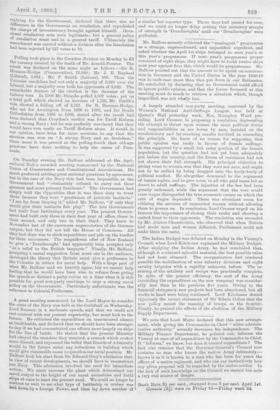On Tuesday evening Mr. Balfour addressed at the Agri- cultural
Hall a crowded meeting summoned by the National Union of Conservative and Constitutional Associations. He Much preferred settling great national questions by agreement, but in the case of the Navy this had been impossible, as the Government had "obstinately refused to carry out their greatest and most primary functions." The Government had simply told the Opposition that it was their duty to trust them because they were "gentlemen of patriotic instincts." "I am far from denying it," added Mr. Balfour, "if only they would give their instincts fair play." The late Government had built four battleships every year. The present Govern- ment had built only three in their first year of office, three in their second, and only two in their third. They knew in November last of the enormous augmentation of the German output, but they did not toll the House of Commons. All they had done was to shirk expenditure and pile up the burden for their successors. The magnificent offer of New Zealand to give a 'Dreadnought' had apparently been accepted only "as a relief to the British taxpayer." Finally, Mr. Balfour, accepting a casual suggestion from some one in the audience, developed the theory that Britain must give a preference to the Colonies in return for naval help. With a large part of What Mr. Balfour said we heartily agree, but we cannot help feeling that he would have been wise to refrain from giving his speech so distinct a party colour at a time when it is still Possible for great non-party meetings to urge a strong naval Policy on the Government. Particularly unfortunate was the reference to Colonial Preference.










































 Previous page
Previous page